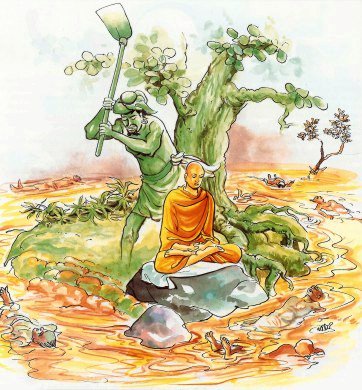By energy and heedfulness,
by taming and by self-control,
the one who’s wise should make as isle
no flood can overwhelm.
Explanation: The whole world is full of defilements. The sensualities of life are a vast and forceful flood. But the wise person builds steadfastly for himself an Island that cannot be washed away by those vast floods. The Island is built of steadfastness, mindfulness, restraint and discipline. Once steadily established on that island, the flood cannot overwhelm the wise.
The Story of Culapanthaka (Verse 25)
While residing at the Veluvana Monastery, the Buddha spoke this verse, with reference to Culapanthaka, a grandson of a banker of Rajagaha. The banker had two grandsons, named Mahapanthaka and Culapanthaka. Mahapanthaka, being the elder, used to accompany his grandfather to listen to religious discourses. Later, Mahapanthaka joined the Buddhist religious order and soon after became an arahat. Culapanthaka too followed his brother and became a monk, but could not even memorize one verse in four months.
About that time, Jivaka came to the monastery to invite the Buddha and the resident monks to his house for a meal. Mahapanthaka, who was then in charge of assigning the monks to meal invitations, left out Culapanthaka from the list. When Culapanthaka learnt about this he felt very much frustrated and decided that he would return to the life of a householder. Knowing his intention, the Buddha took him along and made him sit in front of the Gandhakuti hall. He then gave a clean white piece of cloth to Culapanthaka and told him to sit there facing east and rub the piece of cloth with his hand. At the same time, he was to repeat the word “Rajoha-ranam” , which means “taking off impurity” The Buddha then went to the residence of Jivaka, accompanied by the monks.
Meanwhile, Culapanthaka went on rubbing the piece of cloth, all the time muttering the word “Rajoharanam”. Very soon, the cloth became soiled. Seeing this change in the condition of the cloth, Culapanthaka came to realize the impermanent nature of all conditioned things. From the house of Jivaka,
the Buddha through supernormal power learnt about the progress of Culapanthaka. He sent forth his radiance so that the Buddha appeared to Culapanthaka to be sitting in front of him, saying: “It is not the piece of cloth alone that is made dirty by the dust; within oneself also there exist dusts. Only by removing the dirt could one achieve one’s goal and attain arahatship”. Culapanthaka got the message and attained arahatship.
At the house of Jivaka, they were about to offer water before serving food, as it was customary, but the Buddha covered the bowl with his hand and asked if there were any monks left at the monastery. On being answered that there were none, the Buddha replied that there was one, and directed them to fetch Culapanthaka from the monastery. When the messenger from the house of Jivaka arrived at the monastery he found not only one monk, but a thousand identical monks. They had all been created by Culapanthaka, who by now possessed supernormal powers. The messenger was baffled and he turned back and reported the matter to Jivaka. The messenger was sent to the monastery for the second time and was instructed to say that the Buddha summoned the monk by the name of Culapanthaka. But when he delivered the message, a thousand voices responded, “I am Culapanthaka”
Again baffled, he turned back for the second time. Then he was sent to the monastery, for the third time. This time, he was instructed to get hold of the monk who first said that he was Culapanthaka. As soon as he got hold of that monk all the rest disappeared, and Culapanthaka accompanied the messenger to the house of Jivaka. After the meal, as directed by the Buddha, Culapanthaka delivered a religious discourse confidently and bravely, roaring like a young lion.

